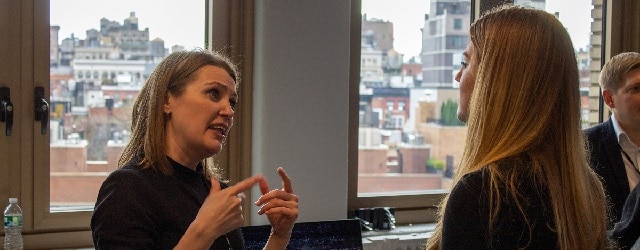Just 10 finalists make it past the pitch and the demo to gain acceptance into the Fintech Innovation Lab.
 Anastasia Dokuchaeva (l), head of partnerships for ClauseMatch, flew in from London to win over financial executives at Demo Day. |
Adam Wenchel first learned about the Fintech Innovation Lab from his investors, who encouraged him to apply just a few days before the deadline. ArthurAI, which monitors artificial intelligence (AI) in the real world, is his second startup; and he had always been skeptical of incubators, because they require a valuable resource: time.
“But when we talked to our investors and other companies that have been through this one, it definitely seemed different; because the conversations you ended up having with these banks were with really high caliber people,” Wenchel says. “We decided to break our rule for this one.” The ArthurAI team raced to meet the deadline, just 48 hours away.
Fintech innovation labs—or hubs, or incubators, or whatever you call them—have been sprouting up around the world. These centers aim to jump-start innovation by providing startups with some mix of mentoring, workspace, networking and funding. Working with a lab can be game-changing for young fintechs due to the input from bankers, as well as the chance to showcase their work and potentially pilot their products.
This particular one, prosaically named just Fintech Innovation Lab (FIL), is highly competitive, run by the Partnership Fund for New York City (PFNYC) and Accenture since it was formed in 2010. More than 40 financial institutions have signed on with the effort, and each year roughly 100 executives from institutions such as Deutsche Bank, JPMorgan Chase and Guardian Life participate in winnowing more than 250 applicants down to roughly 30 who are invited to pitch, to 20 who are invited to demo their products, then just 10 to enter the 12-week program of intensive collaboration with finance executives. This year, Global Finance is following a single cohort through FIL—from their pitches and demos in February to graduation in July.
| Alkymi |
| ArthurAI |
| Broker Buddha |
| ClauseMatch |
| Egypt |
| DataFleets |
| Knoema |
| Sigma Ratings |
| Summer |
| SkyHive |
| True Flood Risk |
The hopefuls include DataFleets, which works with machine learning algorithms, and whose co-founder David Gilmore knew about FIL from a prior employer. There’s London-based ClauseMatch, which makes document collaboration software for compliance, one of the older applicants. Founder Evgeny Likhoded had applied in the past without success, but tightening compliance laws have opened a new window. Sigma Ratings, based in New York City, deploys machine learning and domain expertise to provide automated risk benchmarking and monitoring of noncredit risks at scale.
Not all are directly finance-focused. Vancouver’s SkyHive Technologies addresses workforce reskilling.
Most teams spent 10 to 20 hours answering the application’s 45 questions about the company, its team, products, customers, business model and more—including, of course, financials. Also key: availability in New York City for an in-person pitch, potential follow-up demo and the 12-week program. Startups are further encouraged to submit a video that provides a sense of the entrepreneur (most do). Each application is scored by at least two banks and one venture capital firm. It is certainly an investment. “Frankly, we’re extremely busy; so I won’t apply unless I’m really, really interested in a program,” says Skyhive founder Sean Hinton.
Invites to Pitch Day went out in late January. The ArthurAI team was thrilled to get the nod and immediately set to putting together a great pitch. The DataFleets team—largely remote even before the coronavirus—celebrated via emojis and selfies on Slack and bubbly drinks at home.
Each company gets 10 minutes to present to some of the world’s top financial executives, followed by 15 minutes of questions. Pitches include an explanation (without demo) describing the problem being solved and the value proposition. “[Pitch day is] like a friendly and very sophisticated version of ‘Shark Tank’—it’s not necessarily made for TV, but the stakes are pretty high,” says Harald Collet, co-founder and CEO of Alkymi. A team might need a handful of slides. Most borrowed from older pitches, in some cases adding material specific to the finance industry.
The entrepreneurs contemplated whom to bring and how much to rehearse. Collet ran through his pitch three evenings in front of his team and investors. Wenchel practiced too. “We didn’t sign up a bunch of people to come heckle us, but we absolutely practiced,” he says.
The Opening Pitches
On Wednesday, February 5, the startups arrived at the Accenture New York Innovation Hub, mostly in jeans and tennis shoes. Hinton wore a favorite black hoodie. A few sported suits. Alkymi’s logo was on screen in the first room, and Collet was first up. He was asked about the product and how it would fit into a bank’s workflow, the end users, the value proposition. As the questions became more technical, his co-founders stepped in.
Hinton’s goal was to connect SkyHive’s mission to the finance industry, and he used his experience to explain different use cases. While he had plenty of experience presenting, “that was the first time we were going into New York, with a little bit of anticipation and excitement thinking ‘this might be our home, this might be cool to be here,’” says Hinton.
Dozens of financial executives were in attendance as judges. After every few presentations, the judges would discuss—especially which entrepreneurs seemed coachable. The mood was serious but not somber, punctuated with laughter. At the end of the day, the 33 startups were scored. The top scorers—21 in all—got an invite to Demo Day on Friday.
The invitation sparked a mad dash to prepare. ArthurAI’s user-experience (UX) designer whipped up a banner that they rush printed, along with T-shirts and pens, eschewed other “schwag”. Likhoded ventured to a local electronics store for a monitor.
DataFleets had planned assuming they would get the invite. “Demo Day is just two days after Pitch Day,” Gilmore explains. “You can’t wait until Pitch Day to prepare for your Demo Day.”
Demo Day
The teams set up their booths. Despite the rushed feeling, the room looked like any professional conference. Maria Gotsch, president and CEO at PFNYC, provided feedback from Wednesday to each startup, one by one: what worked and didn’t work, what questions they’d face and how to answer. She noted where a pitch had issues, sometimes suggesting a change of presenter. David Treat, senior managing director in Accenture’s financial services practice and co-chair of FIL New York, did likewise. “They made us really rethink how we articulated the role of the user, how the user would benefit,” says Collet.
It was time. A hundred financial executives came pouring into the room. Gilmore put out sweets as an icebreaker, then worked to engage the judges with his product—why they were interested and how they’d apply it. “Most of those conversations, they’re so abbreviated, it’s like speed dating,” Gilmore says.
That night Likhoded returned the monitor and met with lab alumnus Ky Nichol, CEO at Cutover, before flying home to London. He immediately booked a flight back to New York. “We just started planning, because—whether we got into the lab or not—we were committed to the US market,” he says. Gilmore flew back to California feeling good. “We did have a lot of good traction at the booth, so that helped build confidence for me personally,” he says.
In late February, Gotsch reached out to the winning startups. Gilmore’s team again celebrated with emojis and selfies on Slack. They cleared their calendars. Some, like ArthurAI, hired staff to help during the lab program. Meanwhile, the global pandemic was taking hold. As companiwes shifted to remote work, FIL decided its lab would be virtual this year, with meetings via video call. The entrepreneurs would not need to come to New York City.



